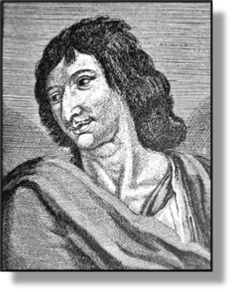


xxxxxThe French writer Savinien Cyrano de Bergerac is best known for his prose fantasies the Comical History of the States and Empires of the Moon, published after his death in 1656, and a similar history of the Sun, six years later. The earliest examples of science fiction, these satires were meant to be humorous, but they also served to cut man down to size. Among other works was his The Pedant Imitated, a comedy of 1654, later used by Molière as part of his play The Cheats of Scapin. He is also remembered for the quality of his letters and his powerful criticism of The Fronde. Today, his name is known as the title of a play by the French writer Edmond Rostand, first performed in 1897 (Vc). Possessed as Cyrano was of a rather large nose, Rostand weaves a work of both comedy and pathos around Cyrano’s emotional traumas in his efforts to declare his love for the attractive Roxane.
SAVINIEN CYRANO DE BERGERAC 1619 -
Acknowledgements
Bergerac: after the French engraver Zacharie Heince (1611-
 xxxxxThe French writer Savinien Cyrano de Bergerac, endowed with a large nose but, so it would seem, a heart to match, joined the corps of guards at the age of 19 and showed a great deal of courage before being wounded at the Siege of Arras in 1640. He left the army the following year and studied under the philosopher, scientist and mathematician Pierre Gassendi. It was during this period that he wrote the two satirical works by which he is best known, the Comical History of the States and Empires of the Moon, published posthumously in 1656, and a similar history of the Sun, published six years later. These prose fantasies -
xxxxxThe French writer Savinien Cyrano de Bergerac, endowed with a large nose but, so it would seem, a heart to match, joined the corps of guards at the age of 19 and showed a great deal of courage before being wounded at the Siege of Arras in 1640. He left the army the following year and studied under the philosopher, scientist and mathematician Pierre Gassendi. It was during this period that he wrote the two satirical works by which he is best known, the Comical History of the States and Empires of the Moon, published posthumously in 1656, and a similar history of the Sun, published six years later. These prose fantasies -
 xxxxxIn such fantasies he was likely influenced by the two earlier works about the moon, written by the English clergymen Francis Godwin -
xxxxxIn such fantasies he was likely influenced by the two earlier works about the moon, written by the English clergymen Francis Godwin -
xxxxxApart from these far-
 xxxxxBut for most people, the name Cyrano de Bergerac conjures up the romantic hero of a romantic play of that name, produced by the French writer Edmond Rostand (illustrated), and first performed in Paris in 1897 (Vc). Based loosely on the 17th century satirist -
xxxxxBut for most people, the name Cyrano de Bergerac conjures up the romantic hero of a romantic play of that name, produced by the French writer Edmond Rostand (illustrated), and first performed in Paris in 1897 (Vc). Based loosely on the 17th century satirist - s suffered by Cyrano. Despite being a chivalrous, witty man of many manly and refined talents, he is convinced that he will never win the affection of the lovely Roxane, the woman he loves, because of his embarrassingly large nose. Only at the point of death does the gallant Cyrano confess his love! The play, a skilful blend of comedy and pathos, proved a great success, not only in France, but in other European countries and the United States. It has since been adapted for both film and television.
s suffered by Cyrano. Despite being a chivalrous, witty man of many manly and refined talents, he is convinced that he will never win the affection of the lovely Roxane, the woman he loves, because of his embarrassingly large nose. Only at the point of death does the gallant Cyrano confess his love! The play, a skilful blend of comedy and pathos, proved a great success, not only in France, but in other European countries and the United States. It has since been adapted for both film and television.
CW-


